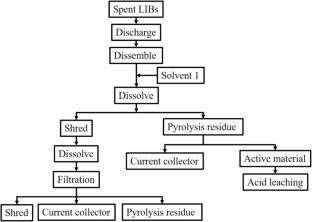A review for high-value utilization of retired spent electrolyte for lithium-ion battery: how to reduce the waste of resources?
Abstract
Establishing a complete recycling chain of decommissioned lithium-ion batteries (LIBs) electrolytes is crucial for promoting the sustainable development of the lithium battery industry and realizing a closed-loop ecology of products. However, the recycling process for cathode materials has not yet solved the problem of environmental pollution caused by organic electrolytes. With the increasing cost of electrolytes in LIBs year by year, the effective recovery and utilization of organic electrolytes is also becoming more and more important. Therefore, from the dual perspectives of efficient resource utilization and environmental protection, it is of great significance to realize the high-value utilization of electrolytes of retired LIBs. This article aims to review the current situation regarding the recovery of electrolytes from retired LIBs. Firstly, the composition and properties of electrolytes in LIBs and the potential environmental hazards are summarized to clarify the necessity for retired LIB recycling. After that, the recycling processes of electrolytes from retired LIBs are discussed in two parts: the research status of vacuum pyrolysis and extraction. The electrolytes in retired LIBs can be treated appropriately but without further utilization or high-value conversion. Based on the comprehensive analysis of the sustainable development of the industry and the need to achieve a closed-loop ecology of products, a high-value utilization direction for the spent electrolytes in retired LIBs is proposed and prospected.


 求助内容:
求助内容: 应助结果提醒方式:
应助结果提醒方式:


